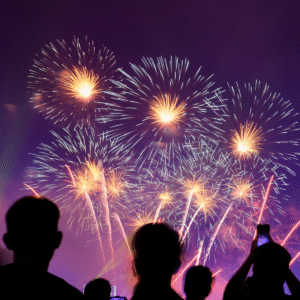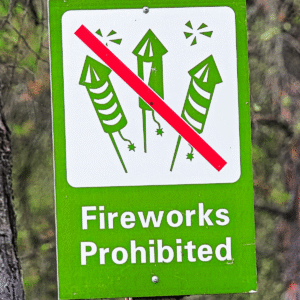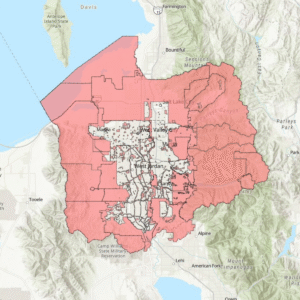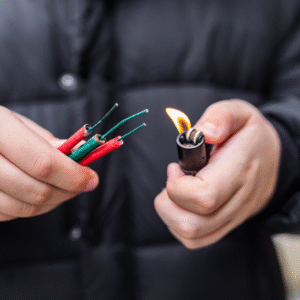Fireworks in Utah: What’s Legal, What’s Not & Who’s Liable
 Firework displays, apple pie, baseball, and blue jeans are all iconic parts of the American experience. While Utahns celebrate holidays with fireworks, it is essential to understand the types of fireworks that are legal, the regulations surrounding their use, and the responsibilities in case of an incident. In this article, we break down Utah’s fireworks laws, so you can enjoy them safely while understanding your rights and responsibilities.
Firework displays, apple pie, baseball, and blue jeans are all iconic parts of the American experience. While Utahns celebrate holidays with fireworks, it is essential to understand the types of fireworks that are legal, the regulations surrounding their use, and the responsibilities in case of an incident. In this article, we break down Utah’s fireworks laws, so you can enjoy them safely while understanding your rights and responsibilities.
What Fireworks Are Legal in Utah?
Not all fireworks are legal in Utah. Both state and federal law permit consumer fireworks classified as “1.4G common state-approved” for public use.1 All fireworks should have “1.4G” labels or language like “Approved for sale in Utah” on their packaging. Exempt explosives like small model rockets, toy pistol caps, emergency signal flare, or wire sparklers are not considered fireworks and can be used by anyone. When buying from a temporary stand, grocery store, or dedicated fireworks shop, you’re most likely getting legal firework products.
Some examples include:
- multi-shot aerial cakes (up to 500 grams),
- fountains,
- sparklers, and
- ground spinners.
At What Age Can You Buy Fireworks in Utah?
Most Utah retailers restrict sales to customers age 16 or older, although state law does not specify a legal purchase age. However, allowing children to handle or ignite fireworks unsupervised may result in the adult in charge being held responsible if something goes wrong.
What Fireworks Are Illegal in Utah?
 Illegal fireworks fall under five main categories:
Illegal fireworks fall under five main categories:
- 1.4G dangerous explosives
- 1.3G (professional fireworks)
- 1.1G
- 1.2G
- Unclassified fireworks
Only licensed professionals with permits may handle these items. It doesn’t matter if these more powerful types of fireworks are purchased outside Utah. Once they are brought into Utah and they are not consumer fireworks (1.4G), they are illegal to use or sell in Utah.
Some examples of illegal fireworks include:
- firecrackers,
- M-80s,
- cherry bombs,
- bottle rockets,
- roman candles,
- single-shot aerial shell mortars,
- any aerial salute/flash shell/comet/mine/cake containing more than 500 grams of pyrotechnic composition,
- and other large explosive devices.
When and Where Can You Legally Set Off Fireworks in Utah?
Utah’s Firework Dates and Times for Legal Use:
- July 2–5: 11:00 AM to 11:00 PM (until midnight on July 4)
- July 22–25: 11:00 AM to 11:00 PM (until midnight on July 24)
- New Year’s: December 31 from 11:00 AM to 1:00 AM on Jan 1; January 1 from 11:00 AM to 11:00 PM
- Lunar New Year: On Chinese New Year’s Eve and two days before, from 11:00 AM to 11:00 PM (extended to 1:00 AM on New Year’s Day)
Fire Restrictions in High-Risk Fire Areas
 There are some high-risk fire zone areas where fireworks are banned year-round (including holidays). Cities publish maps of restricted areas, so always check your local fire department’s restrictions before using fireworks.
There are some high-risk fire zone areas where fireworks are banned year-round (including holidays). Cities publish maps of restricted areas, so always check your local fire department’s restrictions before using fireworks.
Salt Lake City regularly bans fireworks in canyons and near foothills. Lighting fireworks there, even on July 4, is illegal and can lead to penalties.
Penalties and Fines for Illegal Firework Use in Utah
What Happens If You Break Utah’s Firework Laws?
- Fines and Citations: Discharging fireworks at the wrong time or place can result in a $1,000 fine. By using fireworks outside of the designated holiday hours, you risk being fined. Repeat offenders may face harsher penalties.
- Confiscation: Illegal fireworks can be seized by fire officials or police. Retailers selling banned items may lose their licenses.
- Civil Liability: Utah Code § 53-7-225 mandates that the person responsible for a fire must pay the full cost of firefighting and property damage. This obligation applies if the fire is caused by illegal fireworks (Class C explosive). It also applies if someone negligently, recklessly, or intentionally causes a fire with legal fireworks, even if they were used during a legally permitted time.
- Parental Responsibility: Parents are liable for fire caused by their children, unless they took reasonable steps to prevent it.
- Criminal Charges: Reckless use of fireworks that leads to fire, which endangers the life or property of another, can result in charges under Utah Code §76-6-104. Damage over $1,500 may be a Class A misdemeanor. Larger or intentional fires can lead to felony arson charges.
- Insurance Issues: Insurance may deny coverage for damages caused by illegal fireworks, leaving the party responsible to cover costs out of pocket.
Who Is Responsible for Fireworks Accidents?
 Liability depends on the facts, but Utah law generally holds the following parties accountable:
Liability depends on the facts, but Utah law generally holds the following parties accountable:
- The Person Who Lit the Firework
The person who ignites fireworks is responsible for using them safely and following the law. If fireworks cause damage due to negligence, that person is liable, even if it was an accident. Firework use outside of the legal window of time or in a restricted area is strong evidence of negligence, and it could even be considered automatically negligent. If a minor causes the fire, the parent or legal guardian is responsible for the resulting costs and damages.3
- The Property Owner or Host
Property owners who allow others to use fireworks on their property, especially in unsafe or illegal ways, may be held legally responsible under premises liability law. Those who supply or supervise fireworks must take reasonable safety precautions to avoid harm.
- The Manufacturer or Seller
If a firework explodes or misfires due to a design or manufacturing defect, the injured party can sue the manufacturer under Utah product liability law. Retailers may also be found at fault if they knowingly sold defective or banned items.4
For example, just last year at Provo, Utah’s 2024 Stadium of Fire, an incident involving a cracked fireworks tube injured 27 people.5 Investigators found a manufacturing defect, leading to potential product liability claims, and that type of firework being banned from future events.
- Professional Event Organizers
Licensed pyrotechnic operators and event hosts must follow strict safety protocols. Any public or commercial fireworks show in Utah must be conducted by a licensed display operator. Utah’s “Fire Prevention Act” requires that operators acquire a state license through training and proof of competency.6 Additionally, there are special effects fireworks used for concerts or movie sets that require more training. All professional shows must follow strict safety standards and comply with state rules, local fire marshal approval, and insurance requirements.
If the firework vendor violates industry standards and someone is injured, they may be held at fault. Vendors who fail to inspect the fireworks, maintain proper launch distances, or ignore weather conditions could expose themselves to liability.7
Legal Help After a Utah Firework Accident
If you’ve been injured by fireworks or are facing legal consequences from a fireworks-related incident, you don’t have to navigate the legal process alone. Our attorneys at Christensen & Jensen can help determine whether someone else may be at fault for your injuries, property damage, or medical bills. Likewise, if you’re being held responsible for an accident, we can help you understand your rights and options under Utah law.
Fireworks should be fun, but when things go wrong, we’re here to help. If you’ve been injured by fireworks or face legal trouble after a fireworks accident in Utah, contact Christensen & Jensen for a free consultation.
[1] Utah Code Annotated § 53‑7‑202(5) (Supp. 2025).
[2] Utah Code Annotated § 53‑7‑202(6) (Supp. 2025).
[3] (See Utah Code § 53-7-225.1(1)(b)).
[4] Utah Code Ann. § 78B‑6‑701 (Supp. 2025).
[5] Jeremy Tombs, Stadium of Fire Disaster Caused by Explosion Inside 36‑Shot Firework Box, Report Says, Fox13Utah (May 21, 2025), https://www.fox13now.com/news/local-news/northern-utah/stadium-of-fire-fireworks-investigation-report-to-be-released.
[6] Utah Code Ann. §§ 53‑7‑223 to ‑225 (Supp. 2025).
[7] Id.; see also Nat’l Fire Prot. Ass’n, NFPA 1123: Code for Fireworks Display (2022) (widely adopted across the U.S. and incorporated by the Utah State Fire Marshal).


